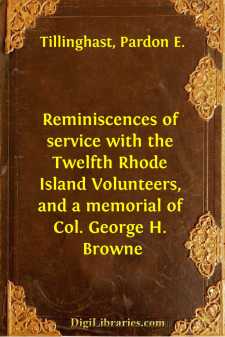Categories
- Antiques & Collectibles 13
- Architecture 36
- Art 48
- Bibles 22
- Biography & Autobiography 813
- Body, Mind & Spirit 142
- Business & Economics 28
- Children's Books 16
- Children's Fiction 13
- Computers 4
- Cooking 94
- Crafts & Hobbies 4
- Drama 346
- Education 46
- Family & Relationships 57
- Fiction 11829
- Games 19
- Gardening 17
- Health & Fitness 34
- History 1377
- House & Home 1
- Humor 147
- Juvenile Fiction 1873
- Juvenile Nonfiction 202
- Language Arts & Disciplines 88
- Law 16
- Literary Collections 686
- Literary Criticism 179
- Mathematics 13
- Medical 41
- Music 40
- Nature 179
- Non-Classifiable 1768
- Performing Arts 7
- Periodicals 1453
- Philosophy 64
- Photography 2
- Poetry 896
- Political Science 203
- Psychology 42
- Reference 154
- Religion 513
- Science 126
- Self-Help 84
- Social Science 81
- Sports & Recreation 34
- Study Aids 3
- Technology & Engineering 59
- Transportation 23
- Travel 463
- True Crime 29
Reminiscences of service with the Twelfth Rhode Island Volunteers, and a memorial of Col. George H. Browne
Description:
Excerpt
The months of July, August, September and October of 1862, were stirring times in Rhode Island,—and in fact throughout the entire North. The vigorous onward movement of our army towards Richmond, which had been long and frequently promised, was still deferred. The decisive victory won by the Union forces over Lee's army at Malvern Hills at great cost, which, in the judgment of every officer in the Army of the Potomac save one, and he the chief, should have been immediately followed by a determined advance towards the rebel stronghold, which was only about a day's march distant, was supplemented by the now somewhat stereotyped order to "fall back," thus presenting the not altogether inspiring military spectacle of a victorious army running away from its defeated and thoroughly demoralized enemy.
General Pope's campaign in Northern Virginia, inaugurated with a great flourish of trumpets, had resulted disastrously; the rebel army was greatly encouraged by the inactivity and the vacillating conduct of their opponents, and had commenced a vigorous aggressive movement. The National capital was again in imminent peril, causing a feverish excitement throughout the country; Baltimore and Cincinnati were seriously threatened, and a great crisis was evidently at hand. Vigorous measures must be adopted at once, or our boasted Republic would soon be a thing of the past.
The President, in view of the great emergency, had ordered drafts, amounting in the aggregate to six hundred thousand men, one-half thereof for three years, and the other half for nine months, the latter to be drawn from the enrolled militia; and the utmost activity everywhere prevailed in connection with the raising, equipping and forwarding of this vast army of recruits.
Rhode Island was thoroughly alive to the occasion, determined not to be outdone by any of her sister States in meeting this new and pressing demand upon her loyalty and her resources; and meeting it too, if possible, without resort to a draft, which, of course, was obnoxious to the sentiments of the people. In order to promote enlistments, the stores in some places were closed at 3 P. M. each day; war meetings were held every evening, and the greatest enthusiasm was manifested. The whole State seemed to be one vast recruiting camp, and all the people, both male and female, to be engaged in the business. For it should ever be remembered, to the praise of the women of Rhode Island, that they were fully as loyal and as devoted to our country's cause during the rebellion, as were the men; and that in very many cases they suffered and sacrificed quite as much at home, though in different ways, as did their husbands and sons and brothers in the field.
In such a state of public feeling what could I, a young unmarried man, do consistent with a fair amount of self-respect but enlist? Evidently nothing; and so I left the teacher's desk and enlisted as a private in Company C, Eleventh Rhode Island Volunteers, under Captain Charles W. Thrasher. I was detailed for service in the quartermaster's department under Lieutenant John L. Clark, and shortly after was transferred with him (I never knew why) to the Twelfth, and was appointed by Colonel Browne to the office of Quartermaster Sergeant.
Camp Stevens, in Providence, was a lively place during the latter part of September and the first part of October, 1862. The Eleventh and Twelfth regiments were both encamped there together during a part of this time, preparatory to their departure for the seat of war. The former left on Monday, October sixth, and the latter on Tuesday, October twenty-first.
The Twelfth Regiment was composed mainly of good Rhode Island material, and was officered by intelligent, patriotic and brave-hearted men. There were representatives from nearly all of the ordinary walks and callings of life, thus furnishing the command with facilities for almost any emergency; and it was proverbial that whatever could be done by anybody could be done by some one in this regiment....


